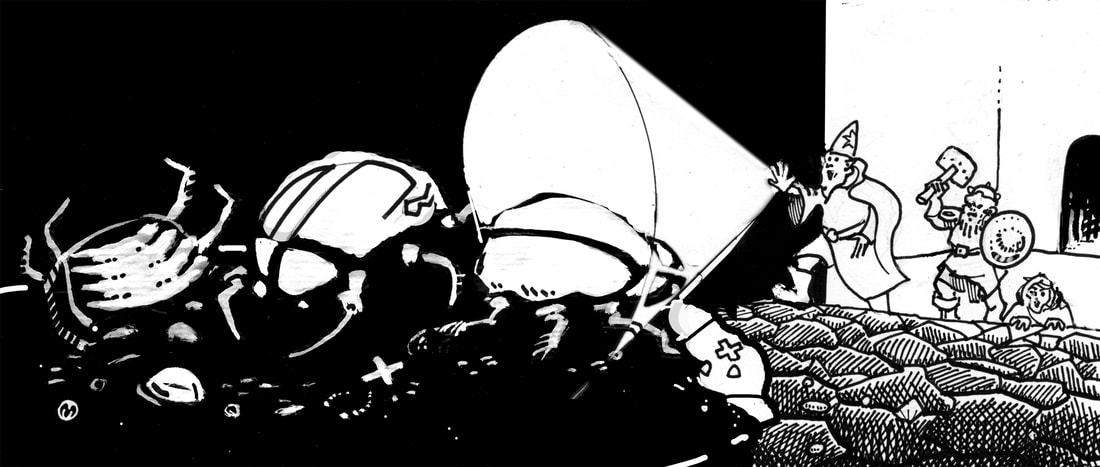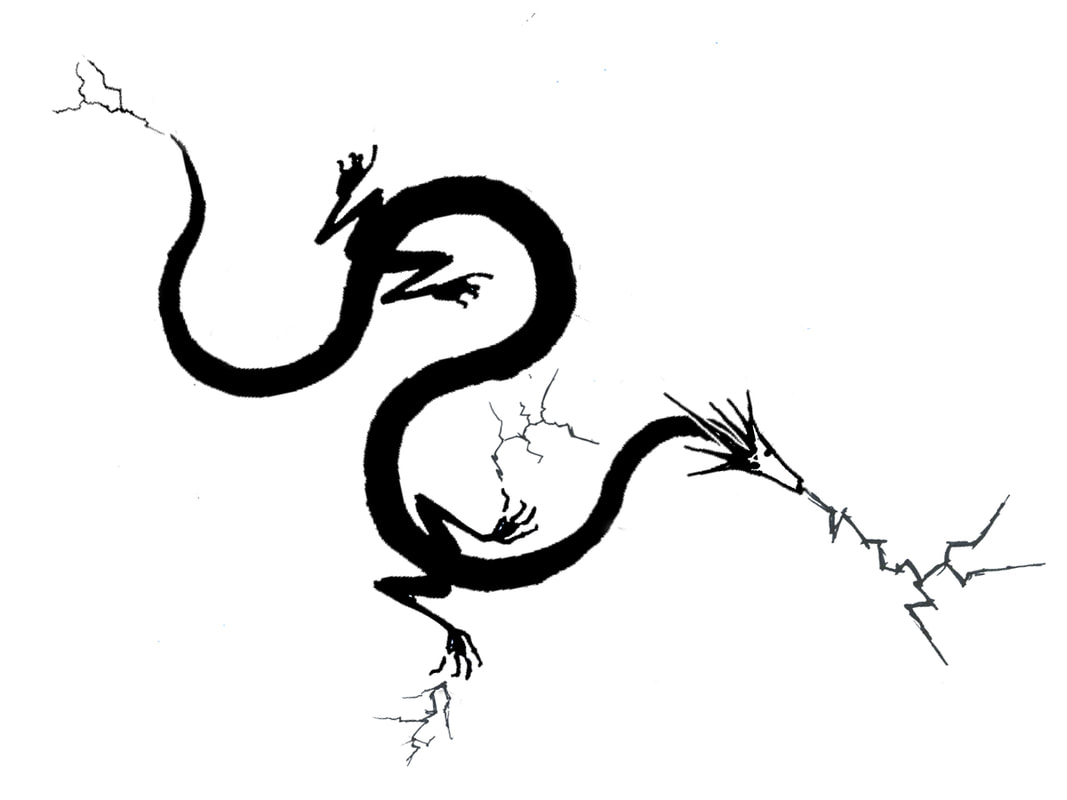|
I really should be finishing up the Cave Adventure series which starts here: www.secretsofblackmoor.com/blog/quick-and-dirty-disposable-dungeons-part-5-the-moaning-cavern Per my usual scatter shotgun blast of overthink I remembered I had mentioned my simple spell point system for OD&D. Many people asked if I could share this system. I had it on a separate hard drive which I had to dig out and pore over to find. You have to understand that I have piles of hard drives. As I glance across my desk area I can see 9 drives. I have many more. Film makers create a lot of data. I did find it today and I went through and tidied up some things, I hope the system makes sense. Worth noting: -It is intended to be fairly simple to use -It makes Magic Users more flexible and fun to play at lower levels -Magical use being based on Intelligence means that wizards are more variable in ability -It draws on ideas from several games, most notably: Steve Jackson Games, Wizard -This is yours to tinker with. Feel free to play with the equations. Do consider that as you get more 'simulationist' and detailed you may lose some of the old school simplicity and abstraction that I personally strive for -I have barely used this system, since I misplaced it after my previous computer exploded, try it out and let me know what you think -This may also work for AD&D just as well. Hopefully I didn't miss anything as I rewrote this. Let me know if anything seems confusing, I will return and edit some more! Griff's system for Magic Spell points for OD&D
Something worth noting and that completely astounds me, is that despite decades of time in which role playing games have evolved into better systems, the same old magic system remains in place for d20 games as was being used in the 1974 version of D&D; with charts for spell acquisition by level and no real influence on performance related to the casting character's main attribute. I realized this had to go, so I have devised my own Concentration or Spell Point system for both Magic Users and Clerics. In order to make low level characters more fun to play, I have allowed them to access more spells at first level. The caveat is that spell failure is also possible. If you compare an 18 Intelligence 9th level wizard’s spell totals in this system to OD&D, you will find that at that level, both systems are equal in terms of total spells. OD&D wizard of 9th level gets spells * level: 4 x 1; 3 x 2; 3 x 3; 2 x 4; 1 x 5. This is equal to 32 spell points. An 18 Intelligence, 9th level, wizard in this system is bonus of 3 + (level 9 * 3 Bonus) = 30 Spell points. OOPS! it's pretty darned close though. Determining Spell Points Spell casters gain spell points based on their main attribute modifier. This number is then multiplied by their character’s experience level. i.e. a second level character with a +2 modifier has 6 spell points. Modifier + (mod * level) Spell Cost In order to cast a spell a character must expend spell points equivalent to the level of spell being cast. Since casting spells requires intense concentration a spell caster uses these points like hit points that represent mental exhaustion. -A spell caster can cast a last desperate spell and use more points than what they have left. -Falling to zero causes the character to fall unconscious. A negative number results in a coma state, much like Sparrow Hawk in a Wizard of Earthsea. It requires another more powerful wizard to draw the player out of the coma between adventures. This is a magical problem, clerics need not apply. -A spell caster recovers 1 spell point per hour rested. -Caster Intelligence also affects how well and for how long they cast spells. Intelligence Based Modifiers 10 or less Cannot use magic. 11 No bonuses, yet can be a very bad wizard. 12- 14 +1 Spell Points (SP) and bonus to chance of success when casting. 15-16 +2 SP and bonus to chance of success as well as +1 duration . -1 for enemy saves.. 17-18 +3 SP and bonus for casting +3 duration -2 for enemy saves. Memorizing Spells Spells require a minimum Attribute and Experience Level to know and cast them. 10 + Level + Magical Bonus. A 3rd level wizard with intelligence of 15 can thus only know spells of levels 2nd and under. i.e. 10 + (level 3 + 2 intelligence modifier) = 15 Required points to Know Spells based on level: Level of spell Value needed to cast 1st 12 2nd 14 3rd 16 4th 17 5th 21 6th 23 7th 25 8th 27 9th 29 Spell Success and Failure Spells require a D20 roll of less than Intelligence - spell level while in combat. A 16 Intelligence wizard casts a 3rd level spell, thus they must roll 16 - 3 = 13 or lower to succeed. Spell failure is common, yet now a wizard gets to cast spells more often. A wizard can opt to concentrate more deeply and be slower thus they have no spell level difficulty modifier, yet their spell is released at the end of the combat round. A successful attack on a concentrating wizard negates the spell entirely.* Spell casting while not in combat gets a free success. i.e. casting a light spell is a good example of this. *I run OD&D as it was originally intended, thus initiative is not in the game system. All actions occur in parallel. Known Spells, Spell Books, and Magical Scrolls There are generally two kinds of written spells. Spell scrolls that are non-magical instructions allow a caster to learn the spell, and magical scrolls allow a caster to use the spell once without expending spell points and allowing the player to cast a spell above their ability level they also never fail as the failure roll comes when making the scroll. Other than scrolls, wizards can only cast spells they know. Known spells can be re-learned if a week is spent between adventures doing so; this allows wizards to pick different known spells. In non-combat situations a spell caster can read a spell that is not memorized from a book or non magical scroll. The limit to a wizard’s known spells is Int + Level. Spell Acquisition 10 + caster bonus When a wizard first wants to acquire spells for their spell book they must choose a spell and then make a die roll modified by the attribute chart casting bonus. Beating a ten means that spell is known, a fail means the wizard cannot try to have that spell in his spell book. Thus a wizard with a 15 Intelligence must roll 10 + 2 bonus = 12 or under in order to gain a specific spell. Emergence of Blackmoor Poster Sets now available in limited quantity in our STORE: store.secretsofblackmoor.com/
10 Comments
|
DVD'S, Books, T-shirts, games and more available on our store.
AuthorSecrets of Blackmoor is a Feature-length documentary about the birth of the “Mother of all Games;” Dungeons & Dragons. Archives
January 2024
Categories |
Privacy Policy
All Contents Copyright © 2023 The Fellowship of the Thing, Ltd. - All Rights Reserved
All Contents Copyright © 2023 The Fellowship of the Thing, Ltd. - All Rights Reserved



 RSS Feed
RSS Feed